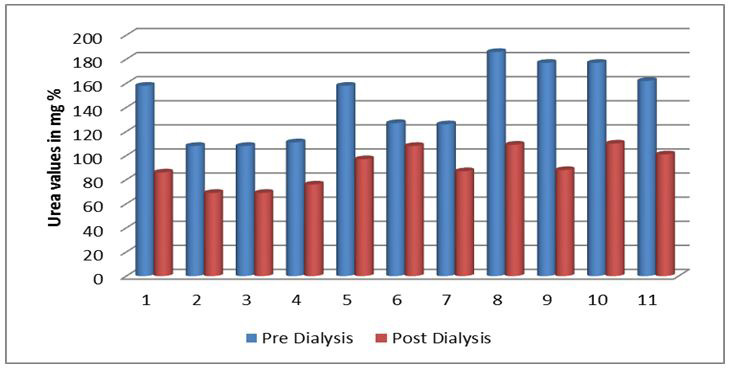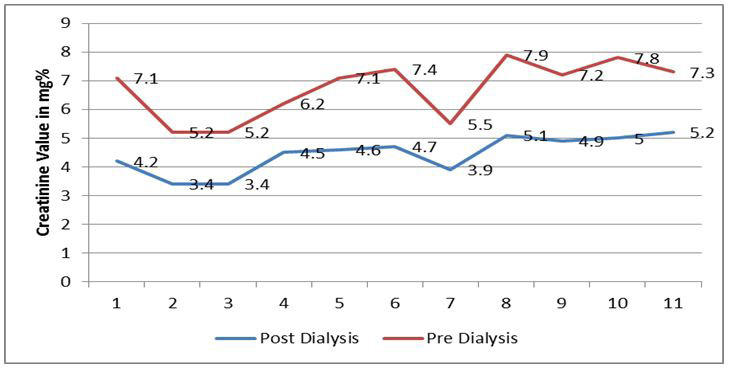Complications in End Stage Renal Disease Patient with Solitary Kidney
Chronic diseases are one of the potential causes behind the morbidity and mortality across the world and Chronic Kidney Disease (CKD) is one of them. Currently, CKD is a major challenge to our health system and society as its prevalence is increasing day by day. Progression of CKD has a ripple effect and is linked to multiple complications like hypertension, shortness of breath, anemia, hyperkalemia, weak immunity, etc. It is known as crippling disease which may directly impact patient and their entire family in a multiple way. CKD patient with End Stage Renal Disease (ESRD) faces several challenges as it involves multiple factors, including an essential role of caregiver. Up to 90% kidney damage occurs in ESRD patient so their survival can’t be extended more than 5 years by the way of dialysis and medication, however timely referral to nephrologists may reduce the risks and complications associated with it. Hemi-nephrectomy can be done to extend the life span of the patient, but only in cases where some parts of the kidneys are damaged. Here we reported a case of 49 years female ESRD patient with a solitary left kidney.
Keywords: Chronic Kidney Disease (CKD); End Stage Renal Disease (ESRD)
Kidney damage once occurred can not be reverted to its initial stage. Chronic kidney disease has not gained much attention, though it is considered to be a silent disease and is the major cause of mortality across the globe. CKD is defined as the presence of kidney damage over the period of years with abnormal albumin excretion or decreased kidney function, quantified by estimating glomerular filtration rate (GFR), that persists for more than three months [1,2]. Complications associated with CKD increases manifold with the progression of disease. Though ESRD at the age of 50 is rare, but hypertension and blood sugar can contribute to its progression even at the age of 45. ESRD patient develops multiple complications and the majority of them have anemia [3]. This is due to the fact that the kidney is the source of erythropoietin synthesis and when kidney function hampers, it has a direct impact on erythropoietin synthesis. Other complications include pulmonary edema, hyperkalemia, cardiovascular problems, weak bones, etc. Furthermore, ESRD patient who undergone hemodialysis have weak immunity so they require frequent hospitalization which further worsen their medical condition.
A 49 year uremic female patients with a classical symptom of chronic kidney disease presented to the emergency department at Maulana Azad Medical College and associated Lok Nayak Hospital, Delhi. She was also diagnosed with hypertension, anemia, chronic liver disease, hepatitis B, hyperthyroidism, pancytopenia, anuria, splenomegaly, hemoptysis, hyperkalemia and moderate to gross ascites revealed through Chest X-ray and Ultrasound report.
This patient had no family history of CKD and she was on a salt restricted uremic diet for past few months. She has undergone a right nephrectomy 22 years back and was functional with only left kidney. The diagnosis of CKD was based on serum creatinine levels, urine test and Glomerular Filtration Rate (GFR: 8 ml/min).
She was on multiple medications for last few years. Her urea values ranged from 110-190 mg% and creatinine in between 8 mg% to 13 mg% for almost all the time (Graph 1 and 2). She was receiving heparin free hemodialysis through an arteriovenous fistula twice a week and sometimes thrice a week as per the severity of the medical condition. As the patient was anemic, so blood transfusion and erythropoietin injections were prescribed to maintain the optimum level of hemoglobin in the body.
Her chest X-ray revealed bilateral massive pleural infusion and ultrasound chest shows few septations on right side. Tube thoracostomy was done a couple of times to drain out the fluid from the chest. Therapeutic pleurotapping was also performed to remove the excess fluid from the lungs as patient complained of breathlessness multiple times (Figure 1).
Awareness about the complications associated with CKD may mitigate the suffering and prolong the life of CKD patients worldwide [4]. It is ironic that most CKD patients are not aware of their disease until kidney functions, severely impaired as reported in this case.
It is well known fact that controlling blood pressure, blood sugar and other comorbid conditions at an early stage is associated with lower mortality [5]. This patient was hypertensive with chronic liver disease which further added complexities and impairs the kidney function completely.
CKD is often underdiagnosed and can be considered as silent killer because of its subtle onset, gradual progression and ultimate kidney failure at later stage [6]. In our case patient initially denied for dialysis, which results a further decline in kidney function over a period of time.
Generally the occurrence of CKD is rare before the age of 45 but its prevalence is increases in proportion to age [7]. We reported a case of 49 years female and probably comorbid conditions were primarily the cause for kidney damage at this age.
Technically challenging procedure hemi-nephrectomy was not possible in this case as left kidney was almost dead and right nephrectomy was done 22 years back. In a few cases hemi-nephrectomy seems to be an effective tool in alleviating complications and extending the patient’s life to some extent [8].
Decline in kidney functions results in multiple complications as revealed through this case report. In time nephrologists opinion, proper medication, regular blood checkup, salt restricted healthy diet are some of the major factors that may impact the longevity and quality of life of patients. In addition, recent trends in lifestyle, dietary changes and co-founding factors are the possible cause behind this disease. The patients having chronic kidney disease encounter many problems for their survival. It has been found that dialysis may prolong life expectancy of ESRD patient, but co-morbid conditions, age, socioeconomic factors, patient compliance are equally important in extending the life span of the patient. Early detection and diagnosis of CKD is an effective tool to reduce the associated costs and complexities associated with this disease.
Obtained
Authors declared no conflict of interest.
I would like to thank Department of Medicine, Maulana Azad Medical College and associated Lok Nayak Hospital for all the excellent care and support provided to the patient during her period of stay at LNJP Hospital.



